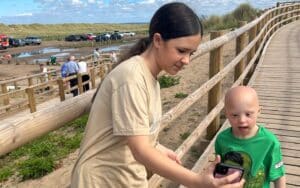Raising a child with special needs is a journey that brings its own set of challenges and rewards. Often overlooked, however, is the experience of the siblings of a child with special needs. They too face a unique set of challenges and opportunities as they navigate their relationship with their brother or sister. Open communication plays a key role in this process. This article suggests a structured framework to foster sibling relationships, delves into the intricacies of fostering a positive relationship between siblings, and offers strategies to guide parents.

Why It’s Difficult
The journey with a special needs sibling can be fraught with mixed emotions. Often, siblings can feel:
- Overlooked: Parents might, unintentionally, divert more attention towards the child with special needs.
- Pressure: There can be unspoken expectations for them to be the ‘perfect child’ or to always understand and help out.
- Emotional Complexity: Feelings of jealousy, guilt, and resentment can sometimes surface alongside love and concern.
Why Nurturing a Positive Relationship is Important
Fostering positive relationships among siblings offers several benefits:
- Emotional Support: Siblings can provide mutual support and understanding.
- Learning Opportunities: Children can support their sibling’s communication development, share ideas, compassion, patience, responsibility, and fun.
- Long-Term Relationship: Siblings often have the longest-lasting relationships with each other, outliving even parental relationships.
Framework for Nurturing Positive Relationships with a Special Needs Sibling
1. Understanding the Landscape
- Assessing Individual Needs: Recognize the unique needs, desires, and challenges of each child.
- Educational Initiatives: Equip the family, especially siblings, with knowledge about their brother’s or sister’s specific special needs and how to best be supportive.
- Open Dialogues: Foster an environment where everyone feels free to express their insights, emotions, and concerns.
2. Establishing a Fair Environment
- Equal Attention: Consciously allocate individual time for each child, ensuring they feel valued.
- Avoid Comparisons: Each child is unique; avoid contrasting their abilities.
- Balance Responsibilities: Ensure roles and responsibilities are fair, not overly burdening one sibling.

3. Building Empathy & Compassion
- Shared Activities: Engage in family activities that both the child with special needs and their sibling can enjoy.
- Empathy Training: Use real-life examples, stories, books, and experiences to instill understanding and patience.
- Celebrate Differences: Highlight the uniqueness of each child, helping siblings appreciate diversity and each other.
4. Communication & Conflict Resolution
- Routine Check-ins: Regular conversations with each child to understand their feelings and concerns.
- Conflict Resolution Tools: Equip children with skills to handle disagreements maturely.
- Validation: Recognize and validate the emotions of each child, ensuring they feel seen and heard.
5. External Support & Resources
- Therapy & Counseling: Offer professional guidance for both individual children and the family as a whole.
- Support Groups: Engage in community or online groups catering specifically to siblings of children with special needs.
- Continuous Learning: Stay updated with books, seminars, and workshops on the subject.
6. Regular Evaluation & Adaptation
- Family Meetings: Routine gatherings to discuss how everyone is feeling and address any emerging issues.
- Feedback Loop: Encourage children to share what’s working and what’s not in their relationship.
- Adapt Strategies: Based on feedback, modify approaches to better suit the evolving dynamics.
Using the framework above, here’s an acronym to help you to remember the process:
U.F.B.C.E.R.
- U: Understanding the Landscape
- F: Establishing a Fair Environment
- B: Building Empathy & Compassion
- C: Communication & Conflict Resolution
- E: External Support & Resources
- R: Regular Evaluation & Adaptation
You can think of it as “Unified Framework for Building Caring, Empathetic Relationships” to help remember the acronym and its significance.
Resources for Further Reading
- Siblings Support Project: An initiative offering information and support for brothers and sisters of those with special needs.
- Sibling Leadership Network: Provides siblings of individuals with disabilities the information, support, and tools to advocate with their brothers and sisters.
- 5 Ways to Support Siblings in Special Needs Families – Child Mind Institute
- What Siblings of Children With Disabilities Can Teach Us (themighty.com)
Summary/Conclusion
The experience of nurturing a child with special needs is undeniably unique, challenging, and rewarding. Alongside this journey, ensuring that their siblings develop a positive, understanding, and compassionate relationship is of paramount importance. While there can be hurdles — from feelings of neglect and jealousy to genuine misunderstandings — a proactive approach, guided by the framework outlined, can make a world of difference.
By promoting understanding, ensuring fairness, fostering empathy, maintaining open communication, tapping into external resources, and continuously adapting to the ever-evolving dynamics, parents can cultivate a harmonious familial environment. As they grow older, siblings will cherish and lean on this bond, appreciating its depth and richness. Remember, every step taken today to nurture this relationship paves the way for a lifetime of mutual support, love, and understanding. We hope that the Unified Framework for Building Caring, Empathetic Relationships can assist you and your family along the way!




0 Comments